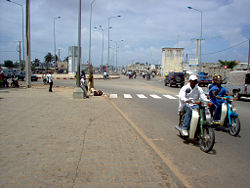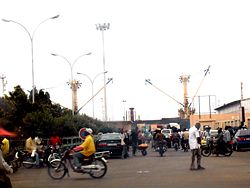Cotonou
| Cotonou | |
 |
|
 Cotonou
|
|
| Coordinates: | |
| Country | |
|---|---|
| Department | Littoral Department |
| Population (2006) | |
| - Total | 761,137 |

Cotonou is the economic capital of Benin, as well as its largest city. Its official population count was 761,137 inhabitants in 2006; however, some estimates indicate its population may be as high as 1.2 million. The population in 1960 was only 70,000. The urban area continues to expand, notably towards the west. The city lies in the southeast of the country, between the Atlantic Ocean and Nokoué Lake, located at 6°22' North, 2°26' East (6.36667, 2.4333). [1]
In addition to being Benin's largest city, it houses many of its government and diplomatic services; thus, it is Benin's de facto capital, even though the official capital is Porto-Novo. The city is best known as a major port, thanks to the Autonomous Port of Cotonou; it is also home to an airport and a railway that links to Parakou. Other features of Cotonou include Cotonou Friendship Stadium, Cotonou Cathedral, Cotonou Central Mosque and the 20-hectare Dantokpa Market, which includes a fetish market and has a commercial turnover of over a billion CFA Francs a day. The National University of Benin is located in Cotonou. Another familiar feature of the city is the motorcycle-taxis known as Zémidjans.
Contents |
History
The name 'Cotonou' means 'the mouth of the river of death' in the Fon language. At the beginning of the 19th century, Cotonou (then spelled Kotonou) was merely a small fishing village. Originally dominated by the Kingdom of Dahomey, in 1851 the French made a treaty with the Dahomean King Ghezo that allowed them to establish a trading post at Cotonou. During the reign of Glele, his successor (1858-89), the territory was ceded to France by a treaty signed on May 19, 1868. In 1883, the French navy occupied the city to prevent British conquest of the area. After Glele's death in 1889, his son Behanzin tried, unsuccessfully, to challenge the treaty. From then on, the town developed quickly to become the largest harbour in the region.
Population trend
- 1979: 320,348 (census count)
- 1992: 536,827 (census count)
- 2002: 665,100 (estimate)
- 2005: 690,584 (estimate)
Transportation and economy

The Autonomous Port of Cotonou is one of the largest ports in West Africa. The city is connected to Parakou in the north of the country by the Benin-Niger railway. Cotonou International Airport provides service to the capitals of the region and to France, as well as the major cities of Benin: Parakou, Kandi, Natitingou, Djougou, and Savé. There are also road connections to several neighboring countries: Nigeria, Burkina Faso, Niger, and Togo.
Because of these connections, Cotonou has become a crossroads of West African commerce, with much trade moving here from Abidjan because of the Ivorian Civil War. The city is a so-called 'market town,' enabling trade with the countries of the African interior, such as Mali, Burkina Faso, and Niger. In addition to the port, there is a free trade zone in the interior of the city for use by the landlocked Saharan states. However, the city is rife with corruption and illegal trade, especially with neighboring Nigeria. It can be considered the economic capital as it houses two-thirds of Benin's industries and is the headquarters of the nation's major enterprises and banks.
Important manufactured goods include palm oil and cake, brewing, textiles, and cement. Motor vehicles and bicycles are assembled, and there are also sawmills in the city. Petroleum products, bauxite, and iron are major exports. There are also offshore platforms drilling for oil. The city is also a center for the automotive trade, with European brands being sold from vast open-air parking lots.
In Missebo area, Cotonou is a textile market of African Print mainly handled by Indian wholesalers and retailers.
See also
- Cotonou Agreement
- List of deep water ports
External links
References
|
||||||||